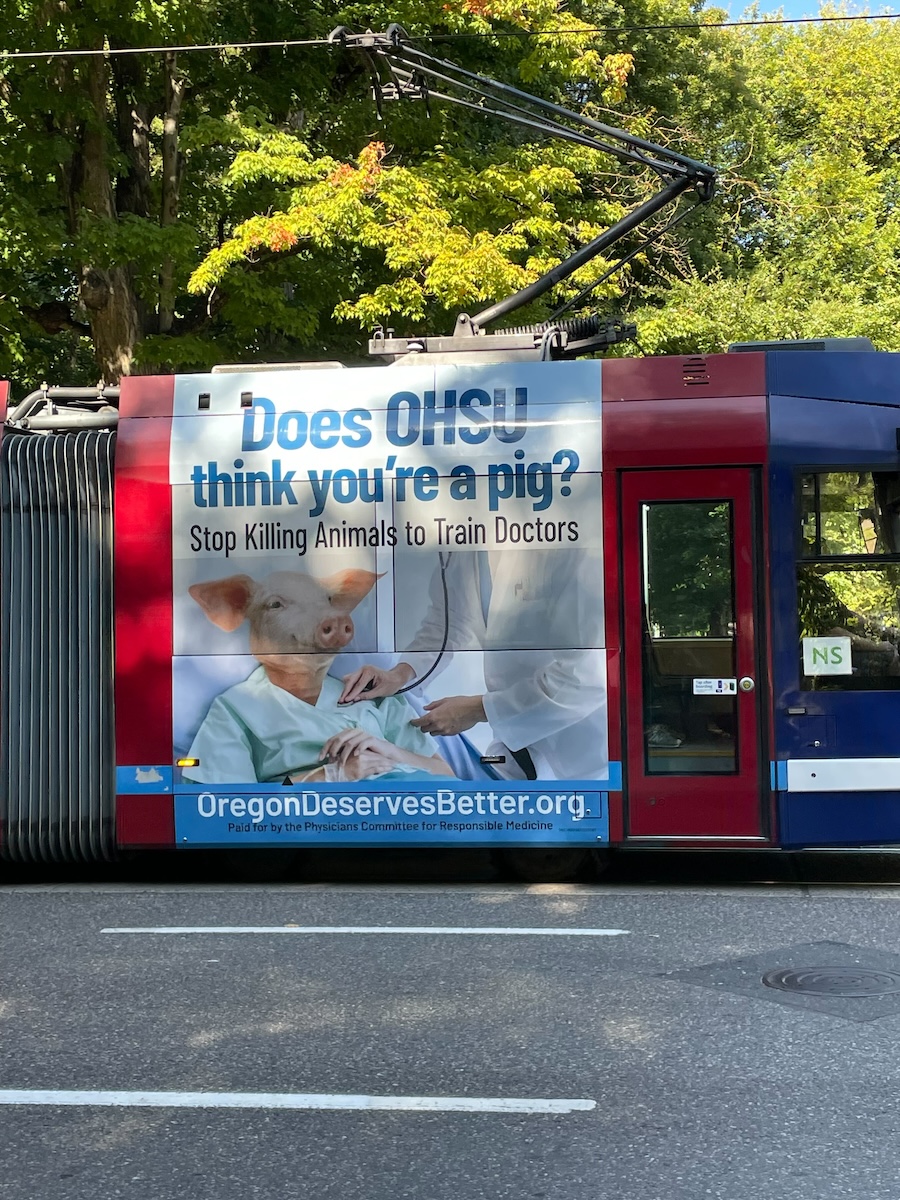A small protest took place outside of Oregon Health and Science University (OHSU) last month. Although some may think it was for nursing unions, it was actually for animal advocacy. Organized by the Physicians Committee for Responsible Medicine (PCRM), the group gathered to raise awareness about the treatment of animals at OHSU.
While OHSU has a history of infractions related to its use of animals in research, the overall impression is that these infractions were unintentional mishaps.
In one study, OHSU used prairie voles in an attempt to demonstrate the impact of alcohol on relationships. Voles have strong social relationships and—unlike rats—participate in drinking, choosing alcohol over the offered water.
Ultimately, the study suggests alcohol can affect the voles’ close bond, which might also give insight into the complexities of human relationships and alcohol.
After this study, People for the Ethical Treatment of Animals (PETA) pressed the school for records, later suing OHSU for not complying with the public records request.
OHSU has conducted several animal studies and has recently been under fire for multiple violations—including at the primate facility—with gruesome accidents as a result of neglect and poor management. This lack of care led to OHSU paying $38,000 in penalties for Animal Welfare Act violations.
OHSU has a Public Health Service Approved Animal Welfare Assurance with the federal government, as well as USDA inspections at all facilities and implemented oversight programs.
In Nov. 2022, OHSU released a public statement reviewing the settlement agreement and included a detailed list of mishaps and mitigation measures.
OHSU has refused to comment on the ongoing campaign directed towards them by PETA and PCRM regarding training with live animals. However, PCRM representative Dr. John Pippin was open regarding the protest and PCRM’s long-term advocacy.
“I have written to the residency director—Dr. Karen Brasel—three times and gotten no response,” Pippen said. “I’ve written to the chair of the surgery department—Kenneth Azarow—three times and have gotten no response. On the day of our recent onsite demonstration, Sept. 7, I delivered a letter to Dr. Brasel, Dr. Azarow and added the medical school dean Dr. David Jacoby. All these weeks later, and we have no response. We have made a substantial effort to establish a dialogue, and they have completely blown us off.”
If you examine PCRM’s posters all over town with explicit imagery, it’s evident that PCRM is an animal advocacy group with a clear objective. “We wanted to make the public—in Portland and in the surrounding areas—aware of what was going on and how their doctors were being trained using substandard methods and how their public university refuses to address it,” Pippin said.
PCRM recommends and advocates for doctors entirely relying on simulations, virtual reality and other artificial training tactics. “There’s no excuse in the world for not using them,” Pippin said. “In fact, OHSU has not one, but two simulation centers that have access to these simulators. And yet they choose to kill animals in the process of substandard training.”
However, OHSU stated, “OHSU only conducts animal studies when other nonanimal research methods, such as laboratory-based cell culture, simulation, gene chips or computer modeling are scientifically inadequate and/or when experimental designs are too dangerous for human participants.”
Moreover, science does not support that using live animals is a substandard way to train doctors. A review published in the Journal of Surgical Education—the culmination of the research they collected—showed the results suggest an educational benefit of live models.
In another comparative study—published by The American Surgeon—there is no observed difference between the use of either live animals or simulation affecting the quality of a doctor’s training.
Exploring the track record of OHSU, the violations and recent news coverage had little to do with the pigs at facilities, but mainly the neglect of enclosures and routine care for the animals. These documented violations are more reflective of neglectful pet owners than malicious scientists.
Rather than focus on the potential to improve the quality and condition of animals in this training process, Pippin doubled down. “There’s not any way to do this humanely because of what the pigs suffer, but also because of what the public suffers by having their surgery residents trained using substandard protocols,” Pippin said. “When we think of ethics, we don’t just think of animals. We think of what the ethics regarding patient care are.”
When asked about the organization’s stance on vegetarianism and if that affected how these trainings were valued, Pippin said it wasn’t relevant. “It has nothing to do with it,” Pippin said. “We’re talking about training doctors, and our interest is in the best way to train doctors. And, when possible, to do so without sacrificing animals… The approach we take has to do with the quality of training and the abuse and killing of animals in order to produce an inferior product.”
However, this differs from the organization as a whole. PCRM is overtly biased towards a plant-based diet, openly advocating for a vegetarian meal plan. Rather than focus on reducing meat consumption and trying to diversify the types of nutrients people consume, the group focuses on removing meat and dairy altogether.
PCRM was founded in 1985 by Dr. Neal Barnard. Barnard was professionally trained as a psychiatrist and spent a lot of his professional focus on nutritional research. His biases are openly stated, and should therefore be considered when looking at his research and if the results lead to the attitude or the attitude leads to the results.
PCRM has faced criticism from the Center for Consumer Freedom team (CCF). CCF claimed that PCRM purportedly emphasized potential links between meat consumption and cancer risk without providing proper citations or a detailed explanation of this correlation.
Another group labeled them the vegan-promoting physicians group and raised concerns about perceived suspicious activities within the organization. These concerns included illegitimately claiming to be a doctor and a history of disseminating biased or one-sided information.
PCRM maintains connections and collaborations with animal advocacy organizations like PETA. PETA frequently employs emotionally charged language rather than presenting factual information. For instance, PETA has characterized the utilization of pigs for medical purposes as mutilation, emphasizing emotional bias over more adaptive and informative descriptions. PETA tends to rely on stirring emotions to motivate people to take action, sometimes offering less comprehensive information in the process.
Obtaining unbiased information—particularly on emotionally charged topics—can be challenging. It’s crucial to approach such subjects with a critical mindset and consider the motivations behind the desire for certain information to be perceived as accurate. Even in emotionally charged content, there may still be elements of legitimacy which warrant further examination.






